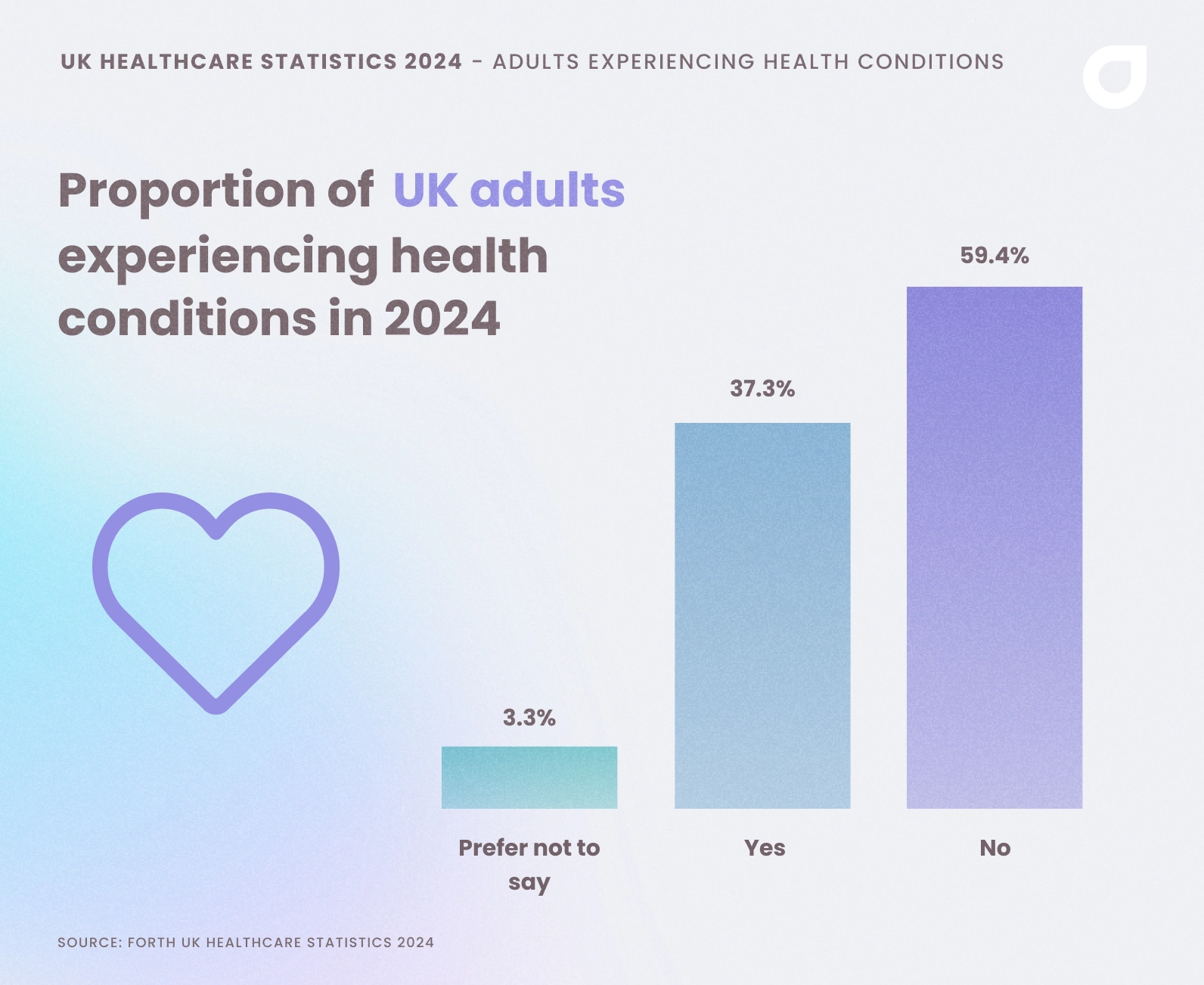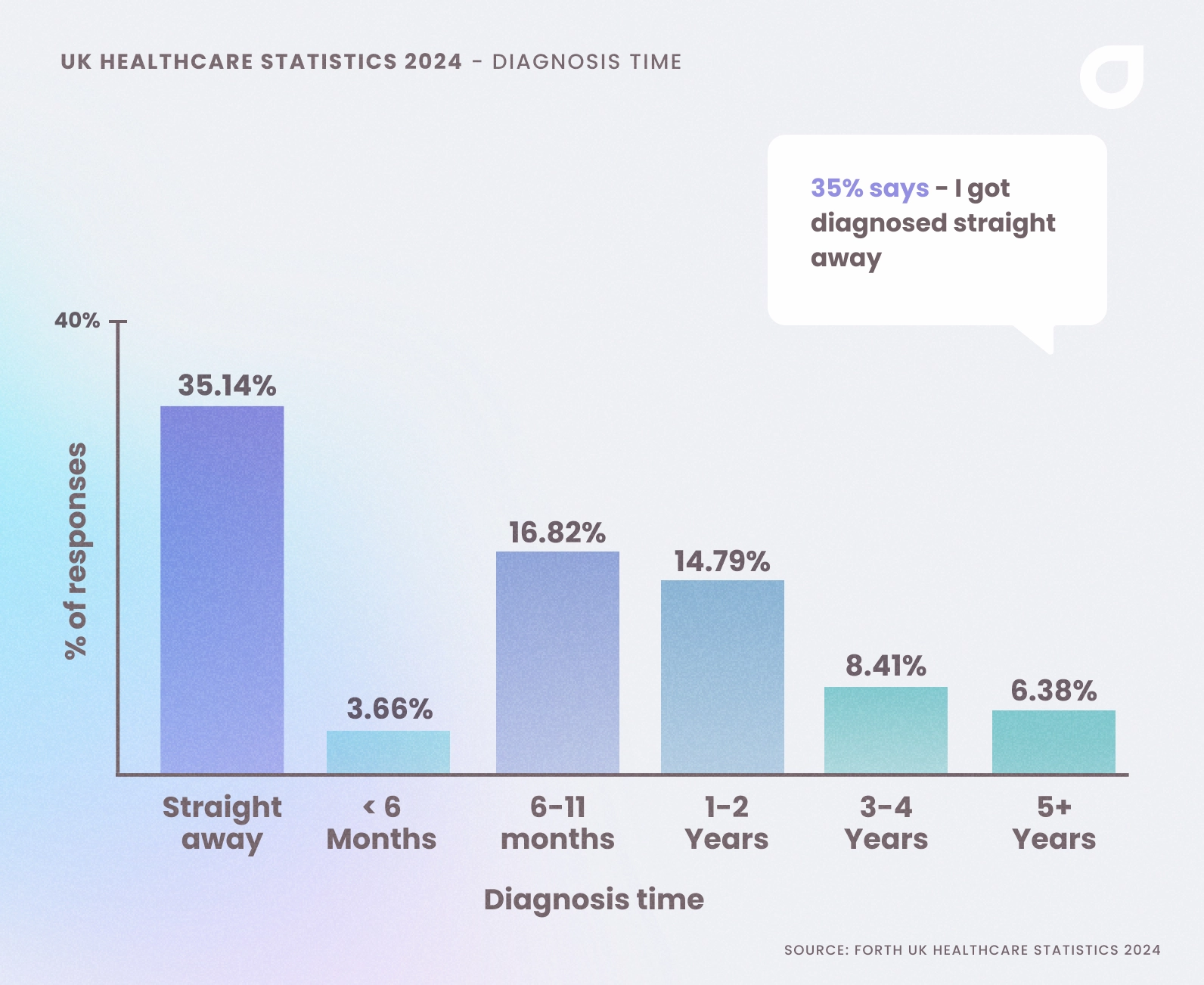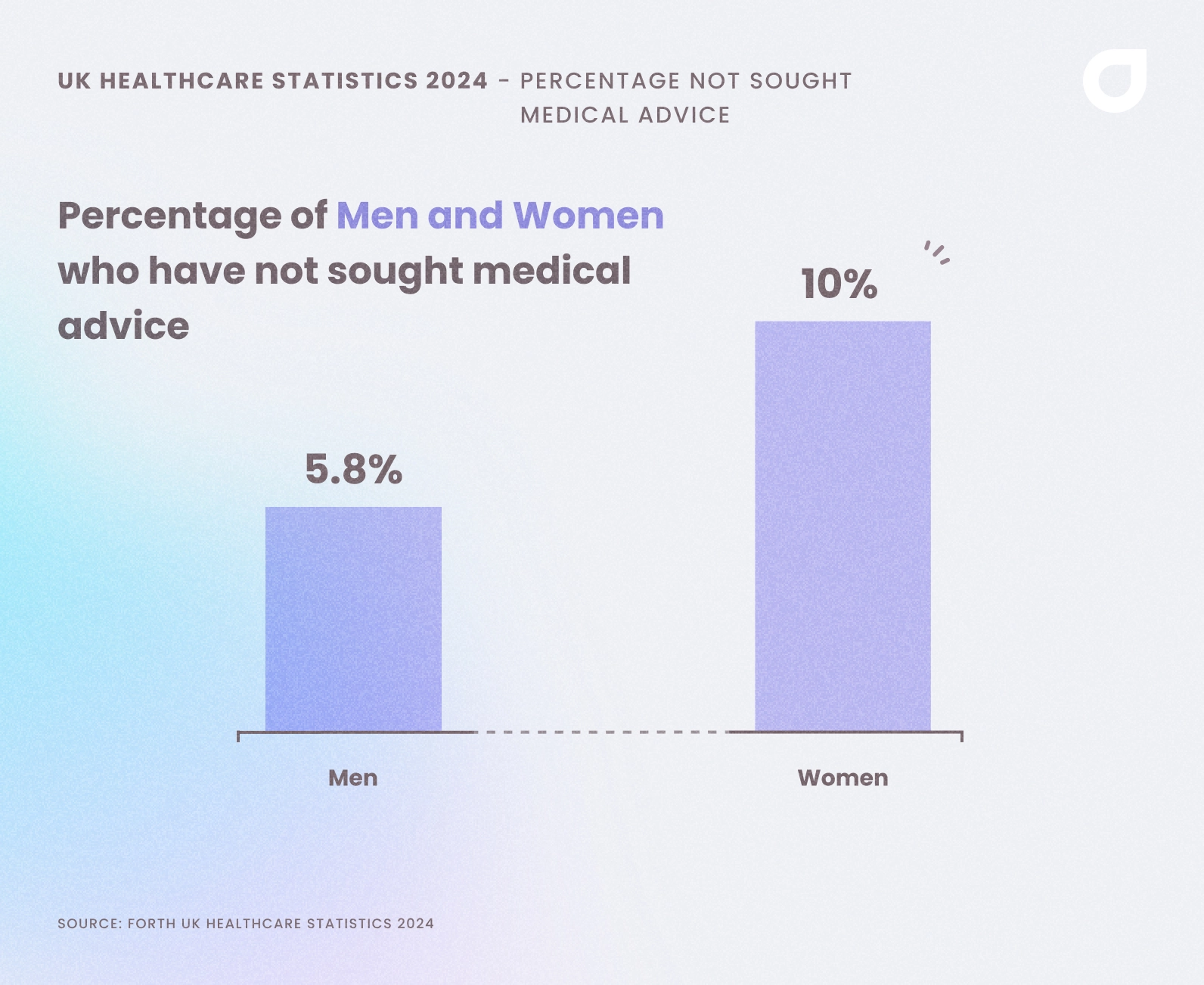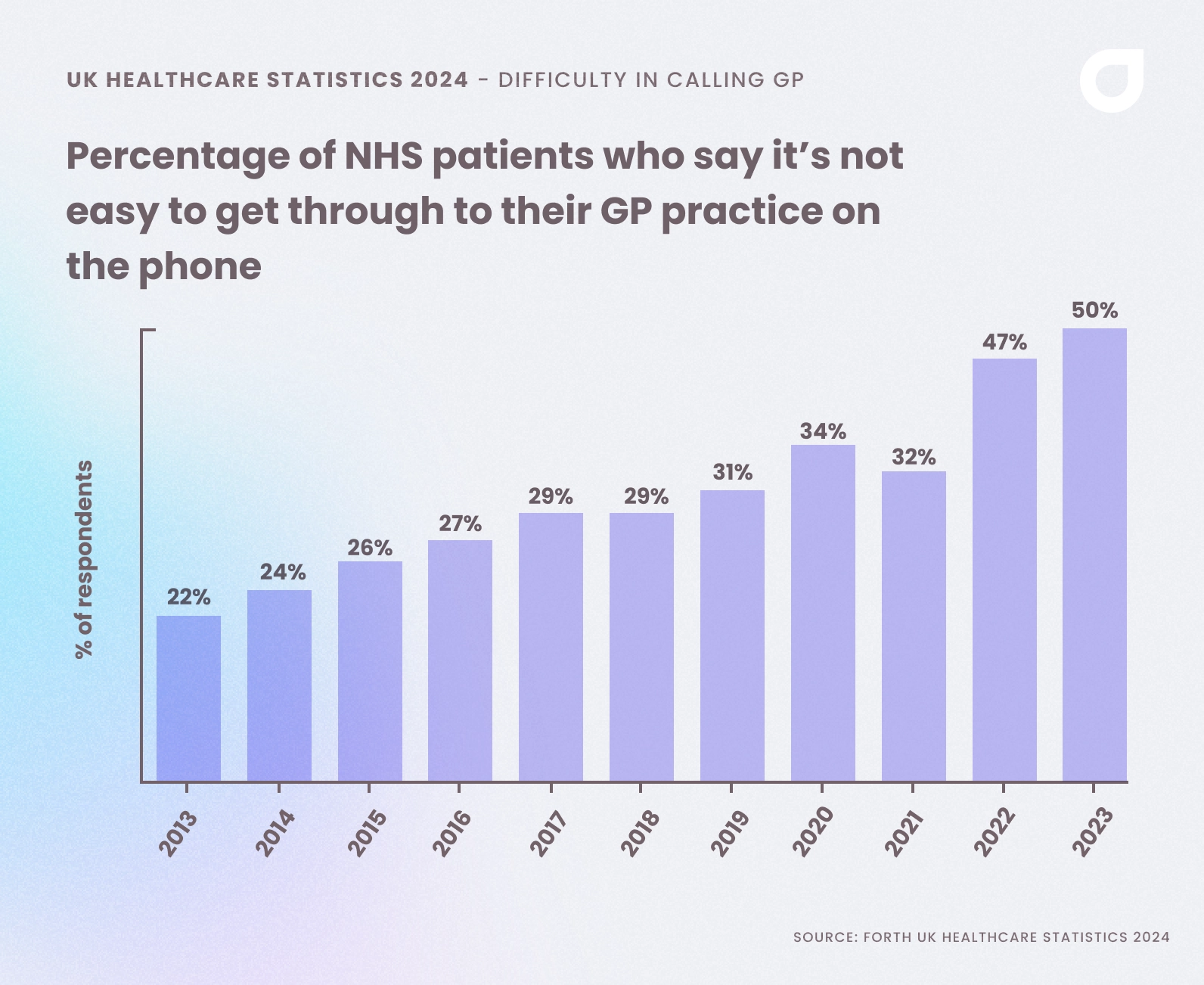10 mins read
UK Healthcare Statistics for 2024

Did you know that 40% of women in the UK have a health condition? And another 10% are currently experiencing an undiagnosed health condition but have not yet sought medical advice? In this article we reveal all of this and more, bringing you all of the most up-to-date facts and figures on the topic of women’s health in 2024.
We pride ourselves in always staying up-to-date with the latest research surrounding health and wellbeing in the UK, and we feel it’s important to share these findings with you too. That’s why in January 2024, we surveyed a representative sample of 1,978 UK adults asking about their current health and wellbeing, as well as the diagnosis times they’ve experienced. We also conducted an analysis of NHS England prescription data and gathered research from feedback provided by 2.65 million NHS patients.
Short on time? Here’s a summary of our key health and women’s health statistics of 2024
There are a lot of findings presented in this article on the topic of healthcare in the UK, so here’s the quick version!
- As of 2024, 40% of women and nearly 35% of men in the UK have a health condition
- Although currently experiencing symptoms, 10% of women and 6% of men have not yet sought help from a medical professional about a health condition they believe they have
- In the UK, it takes almost 18 months to get a health diagnosis, on average
- Of patients who needed a medical appointment in the last year, more than half (51.4%) said they avoided making one. The most common reasons for this were finding it too difficult to make an appointment (28%), worries about burdening the NHS (15%) and not having enough time (10%)
- Last year more than half of NHS patients said they did not find it easy to get through to someone at their GP practice on the phone
- In 2023, NHS England prescribed over 1 billion items of medication
- All of this medication came at a cost of over £10 billion to the NHS, higher than any other year in the last 5 years
- The most commonly prescribed medication types in the UK are those used to treat cardiovascular issues, such as heart disease and high blood pressure
- The most commonly reported health issues in the UK are arthritis or joint problems (18.4%), high blood pressure (16.6%) and mental health conditions (12.7%)
Health Statistics - How Many People In The UK Have A Health Condition?
We all experience illness at some point or another, from hay fever or symptoms of the common cold, right through to a long-term injury or genetic condition. But just how many people in the UK have a health condition in 2024?
To find out, in January 2024 we used the market research company Censuswide to poll a demographically representative sample of 1,978 UK adults, asking:
Are you currently experiencing any health conditions?
Our survey revealed that:
- Over a third (37%) of UK adults say they’re currently experiencing a health condition
- Whilst 59.5% say they’re not currently experiencing issues with their health
- And 3.5% said they’d rather not disclose this information

Health Condition Prevalence by Gender
Health disparities between genders have long been a topic of interest in healthcare discussions. Both men and women encounter unique health challenges influenced by various factors such as biology, societal norms, access to healthcare, and lifestyle choices. But statistically speaking, are men or women more likely to experience problems with their health?
To find out, we compared all of our survey’s female participants’ answers to those of the men, which revealed:
- More women than men say they have a health problem in 2024
- At present, two-fifths (40%) of women in the UK say they’re currently experiencing a condition related to their health
- Whilst 35% of men say the same
Health Statistics By Age
With so many more findings and much more education surrounding health conditions and their various symptoms, studies have shown that health and wellbeing is a huge priority for younger members of society. But does this mean they’re less likely to experience health difficulties? Or are they actually more likely to say they’re experiencing issues with their health?
To find out, we compared results from all of our survey’s participants, from the youngest (age 16 to 24) right through to those aged 55 and over. Our analysis revealed:
- Perhaps unsurprisingly, older members of the population are more likely to experience health conditions, with 42% of those aged 55+ having a medical condition in 2024
- The likelihood of experiencing a health condition appears to be fairly similar in those aged 45-54, with 41% of this age category stating that they currently have a condition too
- Health condition prevalence is much lower in those aged 44 and under, though, with only around 32% of 35-44 year-olds and 25-34 year-olds currently experiencing issues
- Whilst the least likely age group to be experiencing problems with their health is 16-24 year-olds, with 31% stating that they have issues with their health
| Age group | Percentage of people who are currently experiencing a health condition |
|---|---|
| 16-24 | 31.25% |
| 25-34 | 31.93% |
| 35-44 | 32.70% |
| 45-54 | 40.49% |
| 55+ | 42.23% |
Diagnosis Times In The UK In 2024
Having concerns about your health or symptoms you may be experiencing can be extremely worrying, and when you’re in this situation, the last thing you want to be doing is waiting lengthy periods of time for appointments, tests or results. But unfortunately for many, that is very much the case.
To determine just how long people have to wait to get diagnoses, we asked the following question to participants who said they’re currently experiencing a health condition:
You previously said you are currently experiencing a health condition. How long, if at all, have you been awaiting a diagnosis?
The survey revealed that:
- The average wait time to get a diagnosis for a medical condition in the UK is nearly 17 months
- Nearly half (46.5%) of people experiencing a health condition had to wait more than 6 months to be diagnosed
- Almost a third (29.5%) have had to wait for over a year
- 15% have waited for 3 years or more
- And more than 6% say they waived for more than 5 years to get a diagnosis for their health condition
- Whilst just over a third (35%) say they got diagnosed straight away

How Many People Avoid Seeking Medical Advice?
Sadly, one of the most common reasons why certain illnesses and diseases end up progressing into more serious, longer term issues is due to people avoiding seeking medical advice. Whether it’s due to fear, uncertainty or lack of awareness, this reluctance to seek timely medical attention can significantly impact health outcomes. As a result, conditions that could have been managed or treated effectively with early intervention may worsen, leading to greater health complications and reduced quality of life.
But just how common is it in the UK for individuals to not seek out help from medical professionals when they’re experiencing symptoms of a health condition? Our survey found:
- Around 1 in 12 people experiencing a health condition have not yet reached out for medical advice (8%)
- This is significantly more common in women than men, as although currently experiencing symptoms, 10% of women have not yet sought medical help about a health condition they believe they have
- Nor have 6% of men in this situation

Further data from NHS England’s most recent patient survey also highlighted this issue, with its findings revealing that:
- Of patients who needed an appointment in the last year, more than half (51.4%) said they avoided making one
- When asked why this was, 28% said they found it too difficult to make an appointment
- 15% decided not to make an appointment because they were worried about the burden on the NHS
- Another 10% stated they didn’t make an appointment when they needed one because they didn’t have the time
How Difficult Is It To Get An Appointment With Your GP?
Nearly a third of NHS patients say the main reason they haven’t booked a medical appointment to seek advice for their health condition is because it’s too difficult to do so, and it appears this is not getting any easier. The NHS patient survey revealed that:
- In 2023, more than half (50.2%) of NHS patients said it’s not easy* to get through to someone at their GP practice on the phone
- This has more than doubled over the past 10 years, with just a fifth (22%) of patients saying the same in 2013
- In fact, less than half (49.8%) of patients would currently describe this process as easy, whereas back in 2013, 77% said that getting in touch with someone at their GP practice was easy to do

Most Common Health Conditions In The UK
So now we know the extent to which health conditions are affecting the UK in 2024, and what this looks like on a gender and age level. But which types of illnesses are people experiencing most often? And just how many individuals are affected by these conditions?
To find out we analysed a combination of NHS prescription data from Open Prescribing and further findings from NHS England’s patient survey.
The results from our analysis of prescription data for 2022 in the UK revealed:
- Medications for issues related to the heart are the most commonly prescribed in the UK, with over 340 million prescriptions being made within this category in 2022 alone
- This is followed by medication that specifically targets the central nervous system, such as those used to treat neurological disorders like epilepsy, Parkinson’s disease, and Alzheimer’s disease, with over 224 million items being prescribed within this category
- Endocrine system medications, such as those used to treat hormonal imbalances like diabetes, thyroid disorders, and adrenal gland dysfunctions were also amongst the most commonly prescribed medications
Many of the conditions mentioned above, such as those related to the heart, central nervous system or thyroid tend to be chronic or life-long conditions, which explains why the rate at which they’re dispensed is so high. In fact, NHS England’s patient survey found that:
- 56% of patients said they had one or more long-term physical or mental health conditions, disabilities, or illnesses
The most commonly reported health issues are:
- Arthritis or ongoing problem with back or joints (18.4%)
- High blood pressure (16.6%)
- Mental health condition (12.7%)
- Breathing conditions, such as asthma or COPD (11.1%)
- And diabetes (8%)
Our Health in 2024
As a nation, a significant proportion of us have health conditions, many of which are awaiting diagnosis.
Our physical health is only part of the picture too. Our recent mental health statistics show that 1 in 7 adults in the UK in 2024 are currently experiencing poor mental health and our 2024 stress survey showed over half of us are stressed at least weekly.
While NHS pressures are something we have no control over, there are steps we can take to proactively monitor and improve our overall health and reduce our risk of serious health conditions. Our Clinical Lead, Dr Thom Phillips, goes into the detail:
“NHS waiting times for referrals, assessments and treatment are critically high. We know this and sadly, we can’t influence it ourselves. By all means, keep pushing for referrals where you have an undiagnosed health condition and keep seeking medical advice. But for those of us looking to proactively improve our health, the most important things are to eat a healthy, balanced diet, only drink alcohol in moderation, get regular exercise, sleep well and stay hydrated. And if you’re a smoker, get help to stop. Easier said than done, I know. But so many health conditions in the UK right now are preventable. Take type 2 diabetes, for example, and heart disease – these are both potentially problematic health conditions that can be avoided in many cases.
Not all health conditions are avoidable of course. But it’s always worth doing everything in our own power to keep our bodies as healthy as possible.”
If you’re keen to get a picture of your overall health, our Baseline Health Check is an at-home blood test that gives you a picture of some key health areas.
- Health scores calculated
Close
This information has been medically reviewed by Dr Thom Phillips
Thom works in NHS general practice and has a decade of experience working in both male and female elite sport. He has a background in exercise physiology and has published research into fatigue biomarkers.

Dr Thom Phillips
Head of Clinical Services





